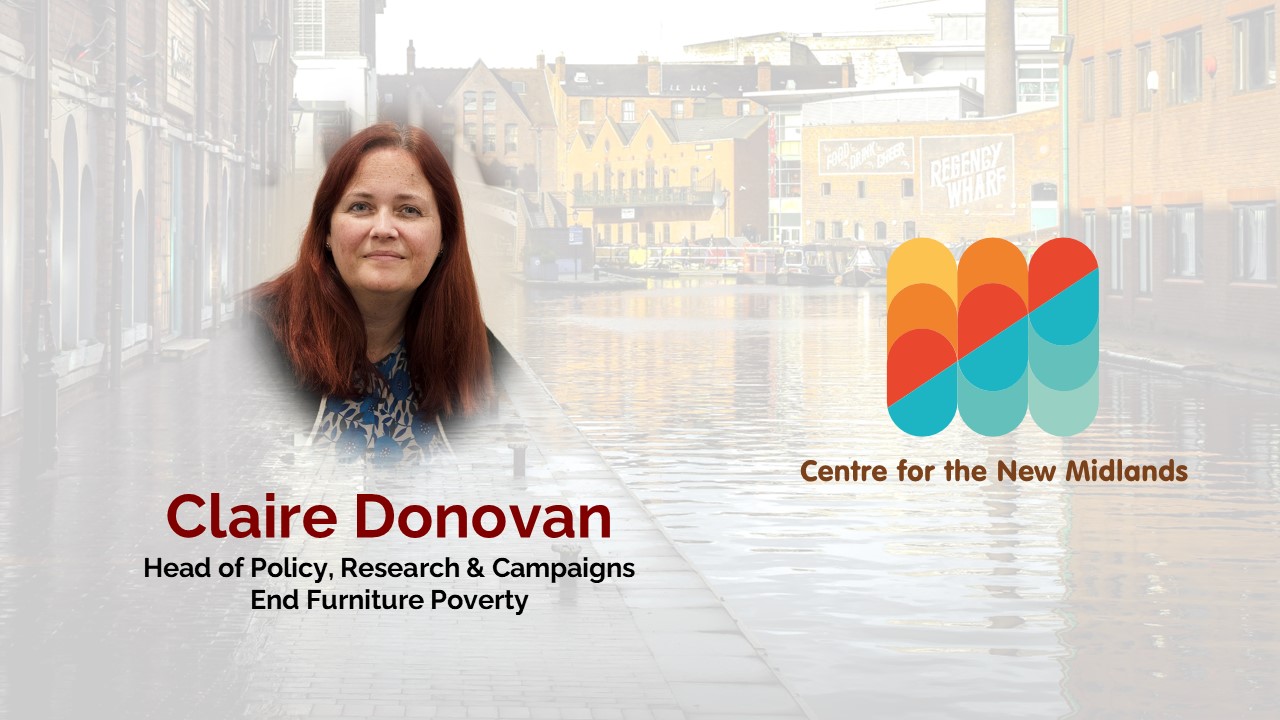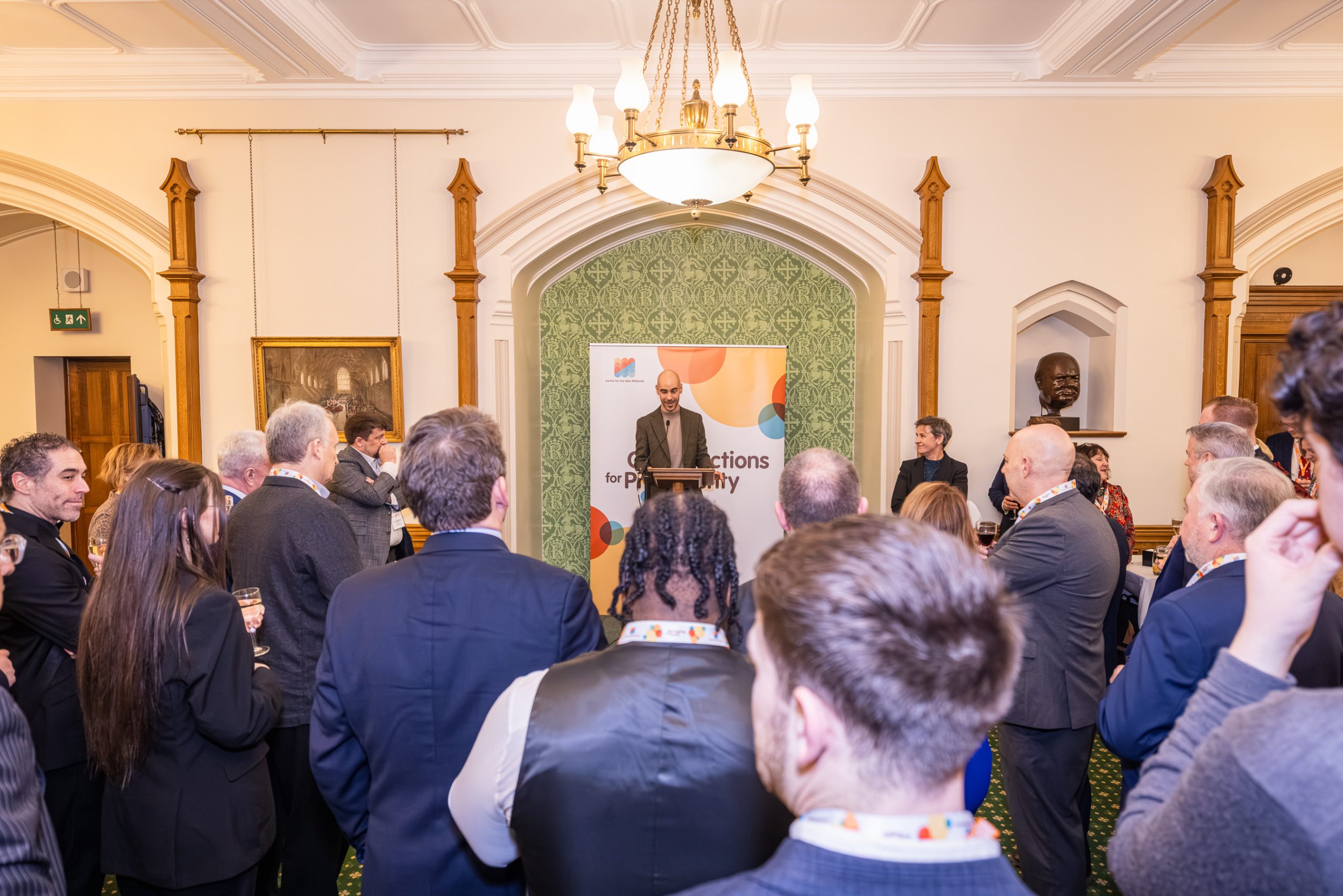As energy bills rise again and demand for food banks continue to grow, the extent and impact of poverty is never far from the headlines but hidden behind millions of front doors lies another subset of poverty that should not be ignored.
In this article, Claire Donovan (Head of Policy, Research & Campaigns, End Furniture Poverty) introduces the concept of Furniture Poverty; the impact that it is having on people’s lives across the country and why, and how, it should be eradicated.
(October 2024)
Furniture poverty is the inability to afford or access an essential item of furniture, appliance or furnishing such as floor or window coverings and over 6 million people, 9% of the population are affected by it, including 26% of social housing tenants. In the West Midlands the figure is even higher, with 10% of the population living in furniture poverty.
Over a million people live in ‘deep furniture poverty’, without three or more essential items, including 8% of social housing tenants.
It means children sleep on the floor or share beds with siblings; families can’t cook or store food because they don’t have a fridge or a cooker; and clothes are washed in bathtubs because there isn’t a washing machine.
Furniture poverty affects people’s health, both physically and mentally, and it affects their financial and social well-being. People can turn to high-cost credit, or even doorstep lenders to try and buy items themselves, or the stigma of furniture poverty means they live in isolation, unwilling to invite friends or support workers into their home because they don’t have a sofa for them to sit on.
At End Furniture Poverty we have researched this issue in great detail, and for over 35 years, our group of charities, FRC Group, has worked tirelessly to support those living without essential furniture items.
Many of us have memories of starting out in our first home, gradually acquiring all the items that we need to make a house a home, but times have changed. Everything costs more – rents are higher, the cost-of-living crisis means other support focuses on food and fuel and meanwhile the cost of furniture and appliances have increased by over 40% in recent years.
For some groups the challenges are even greater. Those fleeing domestic abuse, often with children, people coming from homelessness, or the thousands of people living in temporary accommodation, will usually have nothing and yet only 2% of social homes, properties to house the most vulnerable people in our society, are provided as furnished, compared to 29% in the private rental sector.
We estimate the cost of furnishing a property with all of the essential furniture, appliances and furnishings is around £4,000 yet the cost of not doing so, for the wider public purse, is much, much higher. The cost to the NHS as health is affected, the cost to social care or temporary accommodation as families struggle to pay rent because they have got into unmanageable debt to try and acquire items themselves and end up being evicted. The cost to the community of high turnover tenancies leading to unsettled neighbourhoods. The cost to children’s futures as they struggle in school because they haven’t had a good night’s sleep.
Of course, budgets are tight for so many organisations but there is a solution for social landlords, a way for them to provide a key group of tenants with a furnished home that can actually generate a surplus too – furnished tenancies.
A furnished tenancy is when the tenant is provided with the furniture, appliances and furnishings they need, and the cost is added onto the service charge element of Universal Credit or Housing Benefit. The charge includes the cost of the furniture package, administration costs, and covers future replacements, so the landlord recoups their costs, while the tenant gets everything they need, with the peace of mind of knowing that when it needs replacing, it’s covered.
Under the service charge regulations, they can never own the furniture, but they will never own the property either, it’s the same principle.
At End Furniture Poverty we have been supporting social landlords for many years, helping them to understand how a furniture scheme could work for them and for their tenants, helping to write business cases, and providing a Blueprint for Furniture Provision in Social Housing, a step-by-step guide for landlords.
We have helped landlords to understand how furniture provision can help to reduce rental arrears and void costs, (the cost of turning a property round for a new tenant). One landlord found that providing furniture and therefore a ‘home’ meant tenants looked after properties better so their void costs reduced by an average of £500 per property.
We’ve taken our support a step further in the past year with the creation of a new furniture scheme, Furniture Flex, which has been designed to overcome all of the barriers social landlords face.
Landlords who are struggling to find the capital outlay to buy the furniture, can simply rent it. Some landlords have expressed a concern that a furnished tenancy could be a poverty trap, that a tenant may be reluctant to move off benefits if it means they will have to pay for the service charge themselves. We have found the reality to be the exact opposite, that tenants are far more likely to be in a position to move forward with their lives if they are living in a furnished home and not an empty box. We also have to be honest about that cohort of tenants are likely to remain on benefits for at least the short to medium term.
However, with Furniture Flex, tenants can just return items and the service charge is removed within days. We have also included an enhanced administration support package for landlords worried about additional work. If a landlord brings up a fresh concern that we haven’t covered, we will look at how we can assist, the key is flexibility and working together to lift tenants out of furniture poverty. As one landlord expressed: “It really is a no-brainer”.
We are seeing attitudes to furniture provision change, as landlords recognise other sources of support are much harder to access, but we need change now. That is why End Furniture Poverty is asking the government for legislation to force all social landlords to provide at least 10% of their stock as furnished, as part of our Make a House a Home campaign. The target is based on the 2% that currently exists and the 8% of tenants living in ‘deep furniture poverty’. Plus long-running furnished tenancy schemes have naturally balanced at around 10% of housing stock so we believe it is a realistic and reasonable target.
This target does of course have a cost to the Department for Work and Pensions as the increased number of furnished tenancies would be paid for through the benefits system, but we believe these costs will be outweighed by the overall savings to the public purse and are publishing a Cost Benefit Analysis study in November to prove this.
But fundamentally this is the right thing to do. In a country with the sixth largest economy in the world, we should not tolerate children sleeping on the floor, and we cannot keep moving those in most need of help and support into empty boxes and expect them to sustain a tenancy. We have a solution so let’s use it. Together we can End Furniture Poverty.
ABOUT OUR AUTHOR:
Claire Donovan is the Head of Policy, Research and Campaigns at End Furniture Poverty, the campaigning arm of FRC Group, former Social Enterprise of the Year. The not-for-profit group of charities has over 35 years of experience in providing furniture, appliances, window and floor coverings to people living in Furniture Poverty via local authorities and housing associations. Last year FRC turned over £17m making 27,321 deliveries made up of 377,000 items.
A former journalist, Claire joined FRC Group as Communications Manager, before taking over the delivery of the End Furniture Poverty campaign, which raises awareness of the issue of Furniture Poverty; carries out research to highlight the consequences and reality of living in Furniture Poverty; and develops solutions to ensure that everyone has access to the essential furniture items that they need to participate in society and lead a secure life. Claire is also a trustee of the Reuse Network, the membership body supporting furniture reuse charities across the UK.








